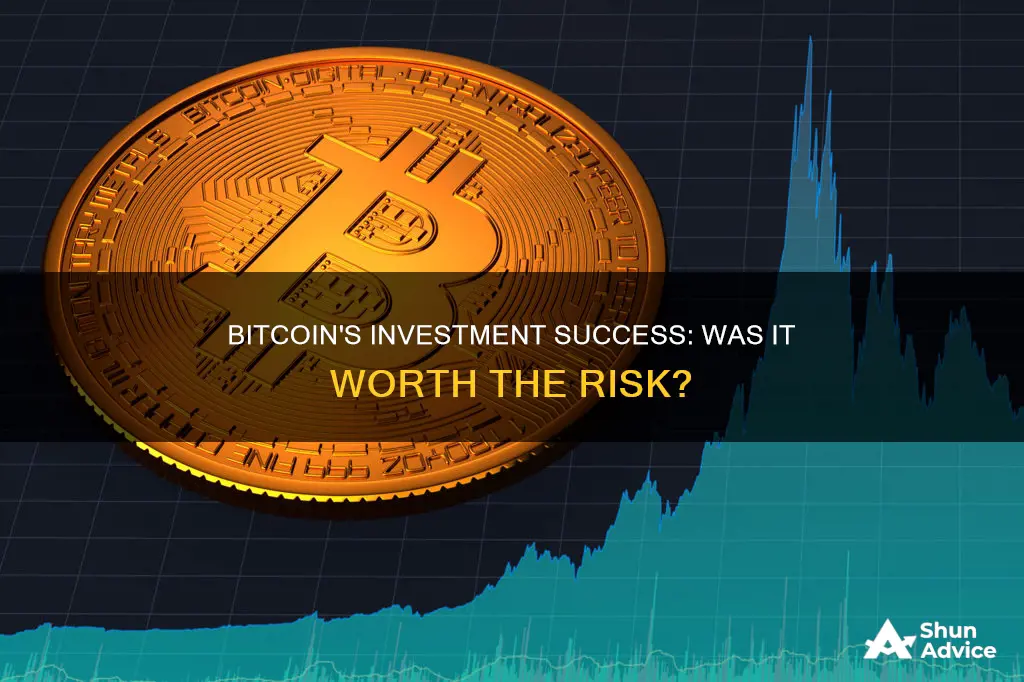
Bitcoin, the original cryptocurrency, has been on a wild ride since its creation in 2009. It is a decentralised digital currency that is not regulated by a central authority, instead giving full control to users. Its value has increased from $1 in 2011 to more than $60,000 at times in 2021 and it is the most famous cryptocurrency. However, it is a risky investment with high volatility and it might never be widely used as an actual currency.
| Characteristics | Values |
|---|---|
| First cryptocurrency | Yes |
| Volatility | High |
| Risk | High |
| Investment history | Short |
| Investment value | High |
| Medium of exchange | No |
| Anonymity | No |
| Regulatory risk | Yes |
| Security risk | Yes |
| Insurance risk | Yes |
| Fraud risk | Yes |
| Market risk | Yes |
| Environmental impact | Negative |
What You'll Learn

Bitcoin's volatility
Bitcoin is considered a volatile financial asset. Volatility is a measure of how much the price of a financial asset varies over time. It is a measure of the riskiness of an asset—the more volatile an asset, the riskier it is to hold. Volatility also increases the cost of hedging, which is a major contributor to the price of merchant services.
Bitcoin's forward-looking implied volatility, as measured by traders' pricing of derivatives, has been higher than what is then realised. This may be a sign of Bitcoin's volatility being misunderstood and still undergoing a process of discovery.
Bitcoin has a short investment history filled with volatile prices. Whether it is a good investment depends on an individual's financial profile, investing portfolio, risk tolerance, and investing goals.
Bitcoin: Investment or Currency?
You may want to see also

Bitcoin's environmental impact
Energy Consumption and Greenhouse Gas Emissions:
Bitcoin mining's massive energy needs and resulting pollution are antithetical to climate progress. During the 2020-2021 period, the global Bitcoin mining network consumed 173.42 Terawatt-hours of electricity, which would rank 27th in the world if Bitcoin were a country. This energy consumption is highly dependent on fossil fuels, with coal accounting for 45% and natural gas for 21% of Bitcoin's energy supply mix. As a result, Bitcoin mining emitted over 85.89 million metric tons of CO2 during the same period, contributing significantly to global warming.
Water and Land Footprint:
Bitcoin mining also has significant water and land footprints. During the 2020-2021 period, Bitcoin's water footprint was similar to the amount of water required to fill over 660,000 Olympic-sized swimming pools, enough to meet the domestic water needs of more than 300 million people in rural sub-Saharan Africa. The land footprint of worldwide Bitcoin mining activities during this period was 1.4 times the area of Los Angeles.
Electronic Waste:
The production and disposal of specialized hardware for Bitcoin mining contribute to the growing problem of electronic waste (e-waste). Bitcoin's annual e-waste is estimated at 30.7 metric kilotons, comparable to the amount of IT and telecommunication equipment waste produced by the Netherlands.
Impact on Climate, Water, and Land:
The environmental impact of Bitcoin mining goes beyond carbon emissions. The UN scientists' report states that the top 10 Bitcoin mining countries, including China, the USA, Kazakhstan, and Russia, are responsible for 92-94% of Bitcoin's global carbon, water, and land footprints.
Addressing Environmental Concerns:
Urgent regulatory interventions and technological advancements are needed to mitigate the environmental impacts of the rapidly growing digital currency sector. Some experts suggest investing in other types of digital currencies that are more energy-efficient and environmentally friendly. Additionally, Bitcoin miners are exploring ways to utilize stranded energy sources, such as natural gas, wind, and solar power, to reduce atmospheric methane emissions and potentially play a beneficial role in environmental conservation.
The Roth IRA Bitcoin Guide: How to Invest
You may want to see also

Bitcoin's regulatory challenges
- Consumer protection: Consumers participating in crypto markets face significant risks, including theft, volatility, misinformation, and deceptive advertising. Ensuring that consumers are adequately protected when investing in or using cryptocurrencies is a critical challenge for regulators. While some countries have implemented rules and regulations to address these issues, others lag behind, leaving investors vulnerable to potential losses and fraud.
- Centralized exchange risks: Centralized exchanges like FTX and Binance, which facilitate "off-chain" transactions, play a crucial role in the crypto ecosystem by lowering the barriers to entry for investors. However, these exchanges often lack transparency about their operations, finances, and governance, putting investors at risk. The collapse of FTX in 2022 highlighted the need for stronger regulations to prevent similar incidents in the future.
- Global coordination: Cryptocurrencies are global by nature, operating across borders and jurisdictions. Achieving global coordination among regulators and policymakers is essential to establishing consistent and effective crypto regulations. However, this task is challenging due to the diverse approaches and varying levels of regulatory development across countries.
- Regulatory definitions and classifications: Cryptocurrencies challenge traditional regulatory definitions, and there is often ambiguity in how they are classified and regulated. For example, in the US, the IRS treats cryptocurrency as property, while the CFTC considers it a commodity. This lack of consistent definitions and classifications makes it difficult to establish clear and comprehensive regulations.
- Rapid technological changes: The crypto space is characterised by rapid technological advancements and innovations. Regulators struggle to keep up with the pace of change, leading to gaps and overlaps in the regulatory framework. As crypto technology firms integrate with traditional financial systems and banks develop crypto infrastructure, the regulatory landscape becomes even more complex.
- Risk and compliance: Regulators are focused on consumer and investor protection across a range of risks, including fraud, cybersecurity, data privacy, misconduct, settlement, liquidity, market integrity, market volatility, transparency, and money laundering/terrorist financing. Developing effective risk and compliance strategies is challenging due to the dynamic and complex nature of the crypto industry.
- Enforcement: The enforcement environment for crypto regulations is complex, and authorities have struggled to address criminal misuse of cryptocurrencies, such as in ransomware attacks and illicit online commerce. The decentralised and borderless nature of cryptocurrencies further complicates enforcement efforts.
- Taxation: Cryptocurrencies pose unique challenges for taxation authorities due to their decentralised nature and the difficulty of tracking transactions. The IRS in the US, for example, treats cryptocurrency as property for tax purposes, while other countries may have different approaches.
- Anonymity and security: While Bitcoin was designed to provide anonymity for its users, it has become evident that it does not offer true anonymity. Successful government efforts to track and retrieve Bitcoin ransom payments have raised concerns about the security and traceability of Bitcoin transactions.
These challenges highlight the complex nature of regulating Bitcoin and other cryptocurrencies. As the crypto industry continues to evolve and gain mainstream adoption, policymakers and regulators must work together to address these challenges and establish a clear and robust regulatory framework that protects consumers and promotes innovation in the space.
A Beginner's Guide: Investing in Bitcoin with Luno
You may want to see also

Bitcoin's security and fraud risks
Bitcoin is a decentralised digital currency that can be bought, sold, and exchanged directly without an intermediary like a bank. It was introduced in 2009 by an anonymous developer or group of developers using the name Satoshi Nakamoto. While Bitcoin has become the best-known cryptocurrency, its popularity has also made it a target for fraudsters and criminals.
Security Risks
One of the main security risks associated with Bitcoin is its volatility. The value of Bitcoin can fluctuate significantly, and it is not backed by any government or central bank. This means that if something happens to the value of Bitcoin, there is no guarantee that it will recover.
Another security risk is the potential for hacking and theft. As Bitcoin is stored in digital wallets, it can be vulnerable to cyber-attacks. Additionally, if something happens to your wallet or your Bitcoin funds, such as sending Bitcoin to the wrong person or losing the password to your wallet, it can be difficult to recover your funds.
Fraud Risks
Bitcoin's pseudo-anonymous nature, with transactions identified by hashes of public keys rather than usernames, also makes it attractive to fraudsters. Fraud schemes and scams are prevalent in the Bitcoin ecosystem, with romance scams, investment scams, and blackmail scams being common tactics used by criminals.
Investment scams often involve promising high returns or guaranteed profits, with fraudsters sometimes impersonating celebrities or creating fake investment websites to lure victims. Romance scams involve gaining a victim's trust through a romantic relationship before convincing them to invest in Bitcoin. Blackmail scams involve threatening to release compromising information or materials unless a payment is made in Bitcoin.
Other types of Bitcoin fraud include exchange scams, where fraudsters set up fake cryptocurrency exchanges, mining scams, and pump-and-dump schemes, where fraudsters drive up the price of a cryptocurrency before selling their holdings at an artificial peak.
Protecting Yourself from Fraud
To avoid falling victim to Bitcoin fraud, it is important to only deal with reputable exchanges and wallet providers and to be cautious of any promises of guaranteed profits or high returns. It is also essential to research the sender before making any payments, as well as to never click on unexpected links or messages, even if they appear to be from a trusted source.
The Future of Money: Why Invest in Bitcoins?
You may want to see also

Bitcoin's investment value
Bitcoin has been described as a risky and volatile investment. Its value has fluctuated dramatically since its creation in 2009, rising to over $60,000 in 2021 before falling to half that value in a few weeks. In 2022, it fell by more than 75% from its all-time high. It has also been described as a speculative investment, with no intrinsic value and not backed by anything.
However, its value has increased from $1 in 2011 to more than $60,000 in 2021. Its limited supply of 21 million Bitcoin could also significantly boost its value. Bitcoin has also been described as a non-correlated asset, similar to gold, meaning it may not follow the trends of other assets like stocks.
There are several risks associated with investing in Bitcoin. It is a digital currency, and people have lost millions of dollars by losing or forgetting their wallet credentials. It is also not insured by the Securities Investor Protection Corporation or the Federal Deposit Insurance Corporation. Bitcoin is also energy-intensive and has a negative environmental impact.
Financial experts are divided on whether Bitcoin is a good investment. Some say it is one of the biggest advances in finance in centuries, while others call it a scam. It is recommended that if you choose to invest in Bitcoin, you should maintain a diversified portfolio and not invest more than 10% of your portfolio in risky assets like Bitcoin.
Small Bitcoin Investments: Are They Worth the Risk?
You may want to see also
Frequently asked questions
Bitcoin is a decentralised digital currency that is not regulated by a central authority. It was introduced to the public in 2009 by an anonymous developer or group of developers using the name Satoshi Nakamoto. It is the first and largest cryptocurrency.
Bitcoin is a risky and volatile investment. It has no intrinsic value and is not backed by anything. It is not widely used as an actual currency and newer altcoins have distinct cost and operational advantages. Bitcoin mining is also clearly at odds with environmentally responsible investing.
Financial experts are divided on the issue. Some say that Bitcoin is one of the biggest advances in finance in centuries, while others call it the biggest scam of all time. Famed investor and CEO of Berkshire Hathaway, Warren Buffett, is against investing in Bitcoin because he doesn't believe it has any utility. On the other hand, Michael Novogratz, founder and CEO of crypto investment firm Galaxy Digital, has long been a supporter of Bitcoin.







